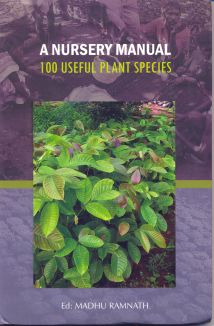
At the rate of deforestation in many parts of the world, there are very few options for communities than to go into active planting in order to restore degraded forests. This manual was borne out of requests to help raise and maintain nurseries in India.
It details nursery raising techniques, including practical advice and illustrations on setting up a nursery. It provides information on 100 forest speciesas well as tips on seed treatment and germination derived from two decades of experience of the Palni Hills Conservation Council, an NGO in the hills of Kodaikanal. Documentation of these techniques is aimed to promote nursery raising and tree planting in degraded areas and farms.
2007. Editor: Madhu Ramnath. With full color plates.
Published by Palni Hills Conservation Council (www.palnihills.org), NTFP-EP and the Keystone Foundation.
For further information, please contact Keystone Foundation, P.O. Box 35, Groves Hill Road, Kotagiri 0643217, The Nilgiris, Tamil Nadu, India; Tel: +91 4266 272277, email: kf@keystone-foundation.org.
Or email the editor at madelly@gmail.com
Two issues of this new newsletter have ben published for the Cambodia Non-Timber Forest Products Working Group (CNWG). It presents feature stories, newsclips and community voices around forests and livelihoods, initiatives in forest conservation, and NTFP livelihood development.
The CNWG is composed of individuals from local and international organizations, government offices, and community-based organizations who share a commitment towards sustainable development, poverty reduction and environment protection in Cambodia. It emerged out of the 1st NTFP National Workshop held in Phnom Penh in December 2006.
The newsletter is published in Khmer but English translations may soon be made available as PDFs.
Copies of all issues are available at the Community Forestry International (CFI) office at #206b, Norodom Blvd, Phnom Penh, Cambodia. Send your comments and inquiries to: Contact: cnwg_news@online.com.kh or cnwg_info@online.com.kh.
Electronic copies may be downloaded at the following links:
1st issue – November 2007
http://www.ntfp.org/bb/bbupload/cambodia/ForestsPeopleandNTFPsIssue1_Nov_07.pdf
2nd issue – December 2007-January 2008
http://www.ntfp.org/bb/bbupload/cambodia/FPN_Issue2_Dec07_Jan08.pdf
3rd issue – June 2008
http://www.ntfp.org/bb/bbupload/cambodia/NTFP_3_Final.pdf
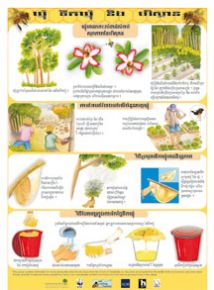
A joint effort of members of the Cambodia NTFP Working Group-Honey subgroup, this poster provides information for local communities that harvest honey from the forests of Cambodia on: why bees are important for the health of the environment; why bees need forests; what the threats are to bee populations; how to earn sustainable benefits from honey and how best to process in the village.
For hard copies, please contact:
WWF Greater Mekong Cambodia Country Programme
#54 Street 352, Sangkat Boeung Keng Kang I
Phnom Penh, Cambodia PO Box 2467
Ph +855 23 218 034
Website: www.panda.org
The PDF attached is the full size and is 5MB
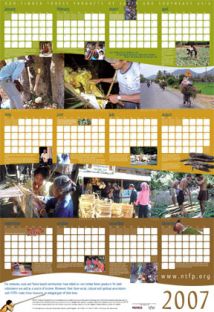
A poster and calendar rolled into one!
Copies are no longer available, but downloadable as a PDF.
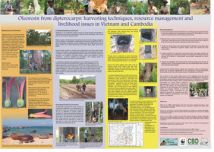
Oleoresin from dipterocarps: harvesting techniques, resource management and livelihood issues in Vietnam and Cambodia
Published by NTFP-EP, Center for Biodiversity and Development (CBD), Worldwide Fund for Nature – Cambodia (WWF), Community Forestry International.
Print copies no longer available. PDF (4 MB) available for download.

This community information poster is another collaborative effort of the Cambodia NTFP Working Group members – particularly Community Forestry International, WWF and NTFP-EP with funding support from their donors. The community poster provides information based on local knowledge and scientific research on better resin collection practices. Better practices for five key activities are outlined with photos and illustrations: size of trees tapped, depth of cut, number of holes, length of time fire is used and a cover over the hole.
Contact: WWF Greater Mekong Cambodia Country Programme
#54 Street 352
Sangkat Boeung Keng Kang I
Phnom Penh, Cambodia
PO Box 2467
Ph +855 23 218 034
Website: www.panda.org
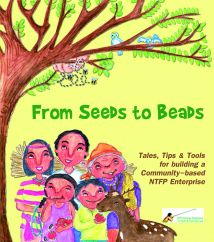
From the Blue Mountains of India to the islands of Indonesia, the experiences of local communities that depend on non-timber resources from forests for their livelihood come alive. Part manual and part storybook, this publication aims to share insights as well as lessons learned by the partners of the Non-Timber Forest Products Exchange Programme that are engaged in NTFP enterprise development.
This compilation of stories from NTFP-EP partners reflects their journey in pursuing strategies for building and maintaining sustainable livelihood enterprises. Furthermore, the most helpful and commonly used tools by NTFP-EP partners are presented. These practical methods aim to enable local partners to systematically and professionally design and implement NTFP development strategies using available resources.
It is hoped that more forest-based communities across Asia will find the inspiration in this publication to embark on innovative enterprises using the resources sustainably within their locality.
Edited by Yasmin Arquiza.
Published by the NTFP-EP. 2008.
Price: US$ 10 (posting, packing and bank commission charges are applicable).
For queries, please email us at publications@ntfp.org
Our publication policy: We provide a limited number of copies for free within our network, as well as to selected NGOs and peoples and community-based organizations working on the same issues. As we have a very limited budget for sending outside our network yet you feel that your organization would benefit from a free copy, please send us an email or letter detailing your organisations work and who would benefit from said material.
Proceeds from sales of publications go to a fund which is used for such distribution costs.
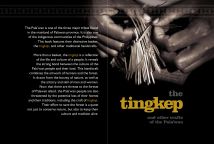
More than a basket, the tingkep is a reflection of the life and culture of the Pala’wan, an indigenous community of the Philippines. This handicraft combines the artwork of humans and their forest. Now that there are threats to the forests of Palawan island, the Pala’wan people are also threatened by the potential loss of their homes and their traditions.
Proceeds from the sales of the book supports the crafts development program of NATRIPAL and NTFP-TF. For queries on how to order, please email: sales@cmcrafts.org
By Nola Andaya and Norli Colili. 2008. Published by The NTFP-EP in behalf of the Pala’wan Community and NATRIPAL
Please contact us for details to get your own copy.
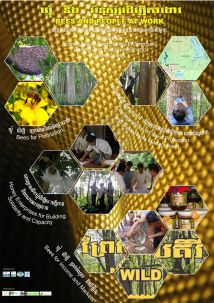
Bees & People at Work. This poster was prepared by NTFP-EP (Cambodia) for the Mondulkiri Honey Festival held 7-9 April 2009 in Mondulkiri, Cambodia.
Photo credits: CFP/Pact, Laura Martelli, Amy Maling/WWF, Femy Pinto/NTFP-EP
For queries, please contact Femy Pinto, NTFP Cambodia Facilitator at femypinto@online.com.kh
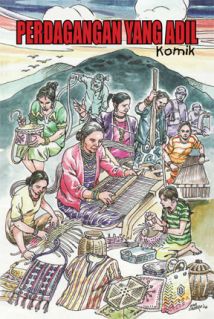
Originally in Filipino, the CustomMade Crafts Center in Manila prepared this comic book to help indigenous and non-indigenous artisans as well as other stakeholders to understand that the principles of Fair Trade have a direct connection to the development of enterprises involving indigenous arts and crafts. This comic book explains the history of Fair Trade, as well as the benefits of following its principles. It also presents the true-to-life experience of an indigenous community that follows the principles of Fair Trade in producing and marketing their handicrafts.
To share the Philippine experience with crafts communities in Indonesia, the NTFP-EP facilitated the translation of this comics into Bahasa Indonesia.
To be made available through Indonesian staff and partners. For queries, please email publications@ntfp.org









